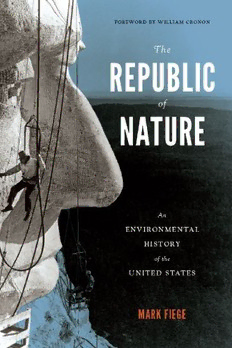
The Republic of Nature: An Environmental History of the United States PDF
Preview The Republic of Nature: An Environmental History of the United States
Weyerhaeuser environmental Books William Cronon, Editor Weyerhaeuser Environmental Books explore human relationships with natu- ral environments in all their variety and complexity. They seek to cast new light on the ways that natural systems affect human communities, the ways that peo- ple affect the environments of which they are a part, and the ways that different cultural conceptions of nature profoundly shape our sense of the world around us. A complete list of the books in the series appears at the end of this book. The Republic of NatuRe an environmental history o f t he united states Mark Fiege university of Washington Press Seattle and London The Republic of Nature: An Environmental History of the United States is published with the assistance of a grant from the Weyerhaeuser Environmental Books Endowment, established by the Weyerhaeuser Company Foundation, members of the Weyerhaeuser family, and Janet and Jack Creighton. © 2012 by the University of Washington Press Printed and bound in the United States of America Design by Thomas Eykemans Composed in Sorts Mill Goudy; display type set in League Gothic; courtesy The League of Moveable Type 16 15 14 13 12 5 4 3 2 1 All rights reserved. No part of this publication may be reproduced or transmitted in any form or by any means, electronic or mechanical, including photocopy, recording, or any information storage or retrieval system, without permission in writing from the publisher. university of Washington Press Po Box 50096, Seattle, Wa 98145, usa www.washington.edu/uwpress liBrary of Congress Cataloging-in-PuBliCation data Fiege, Mark. The republic of nature : an environmental history of the United States / Mark Fiege. p. cm. — (Weyerhaeuser environmental books) Includes bibliographical references and index. isBn 978-0-295-99167-2 (cloth : alk. paper) 1. Human ecology—United States—History. 2. Nature—Effect of human beings on—United States—History. 3. United States—Environmental conditions. i. Title. gf503f54 2012 304.20973—dc23 2011035457 The paper used in this publication is acid-free and meets the minimum requirements of American National Standard for Information Sciences—Permanence of Paper for Printed Library Materials, ansi Z39.48–1984.∞ frontisPieCe Dedication of the Lincoln Memorial, May 30, 1922. Library of Congress Prints & Photographs Division, lC-f81-19718 For Alexandra coNteNts foreWord Environmental History Comes of Age by William Cronon ix land of linColn 3 1 satan in the land Nature, the Supernatural, and Disorder in Colonial New England 23 2 By the laWs of nature and of nature’s god Declaring American Independence 57 3 king Cotton The Cotton Plant and Southern Slavery 100 4 nature’s noBleman Abraham Lincoln and the Improvement of America 156 5 the nature of gettysBurg Environmental History and the Civil War 199 6 iron horses Nature and the Building of the First U.S. Transcontinental Railroad 228 7 atomiC suBlime Toward a Natural History of the Bomb 281 8 the road to BroWn v. Board An Environmental History of the Color Line 318 9 it’s a gas The United States and the Oil Shock of 1973–1974 358 Paths that BeCkon 403 Acknowledgments 430 Notes 434 References 509 Illustration Credits 557 Index 560 illustRatioNs gallery no. 1 Mountains and Monuments 15 gallery no. 2 Animal Familiars 139 Political Ecology 142 Hard Labor 148 Butcher’s Bill 151 gallery no. 3 Iron Horses 265 Nature Study 271 Natural Hazards 275 Lipids and Liberty 278 FoRewoRd Environmental History Comes of Age William Cronon Once in a great while, perhaps every decade or two for a given field, a book comes along that changes the way one thinks about an entire subject. Some- times this happens when a writer of unusual creativity revisits a familiar topic and somehow manages to find in it insights so fresh that it’s hard to believe no one noticed them before. Sometimes it happens when a scholar of unusual range wanders across a vast historiography and ties it together in an act of syn- thesis that discovers unexpected connections among disparate elements that few imagined might be brought together in such a surprising way. And some- times it happens when an intellectual of unusual generosity takes the questions and findings of a specialized subfield and so compellingly demonstrates their relevance to other fields and disciplines that the subfield suddenly feels far more mainstream than one thought. It is rare enough for a single book to succeed at one of these tasks; it is rarer still for one book to accomplish them all. And yet that is precisely what Mark Fiege’s The Republic of Nature: An Environmental History of the United States does. It is surely among the most important works of environmental history pub- lished since the field was founded four or more decades ago. No book before it has so compellingly demonstrated the value of applying environmental per- spectives to historical events that at first glance may seem to have little to do with “nature” or “the environment.” No one who cares about the American past can afford to ignore what Fiege has to say. Having declared my enthusiasm so unabashedly, I should hasten to make sure that I don’t misrepresent the volume you hold in your hands. Despite its ix
